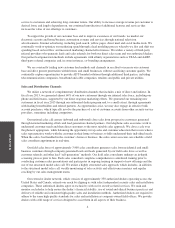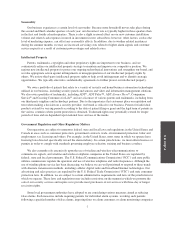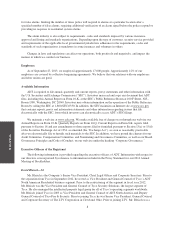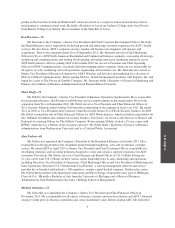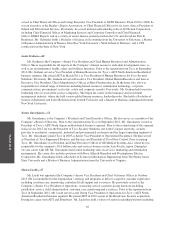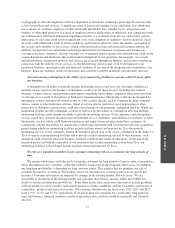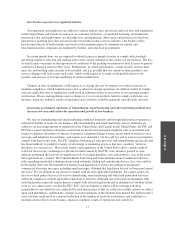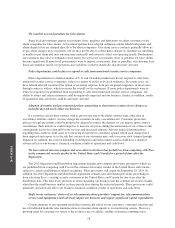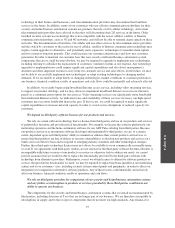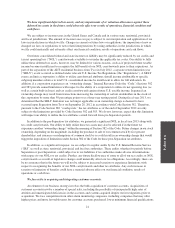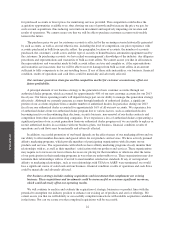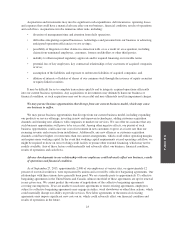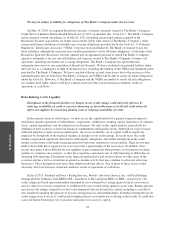ADT 2013 Annual Report Download - page 78
Download and view the complete annual report
Please find page 78 of the 2013 ADT annual report below. You can navigate through the pages in the report by either clicking on the pages listed below, or by using the keyword search tool below to find specific information within the annual report.
FORM 10-K
unavailable or limited in some jurisdictions. Furthermore, while we enter into confidentiality agreements with
certain of our employees and third parties to protect our intellectual property, such confidentiality agreements
could be breached or otherwise may not provide meaningful protection for our trade secrets and know-how
related to the design, manufacture or operation of our products. If it becomes necessary for us to resort to
litigation to protect our intellectual property rights, any proceedings could be burdensome and costly, and we
may not prevail. Further, adequate remedies may not be available in the event of an unauthorized use or
disclosure of our trade secrets and manufacturing expertise. If we fail to successfully enforce our intellectual
property rights, our competitive position could suffer, which could adversely affect our business, financial
condition, results of operations and cash flows.
Allegations that we have infringed the intellectual property rights of third parties could negatively
affect us.
We may be subject to claims of intellectual property infringement rights by third parties. In particular, as
our services have expanded into areas more heavily populated by intellectual property, we have become subject
to claims alleging infringement of intellectual property, including litigation brought by special purpose or so-
called “non-practicing” entities that focus solely on extracting royalties and settlements by enforcing patent
rights. These companies typically have little or no business or operations and there are few effective deterrents
available to prevent such companies from filing patent infringement lawsuits against us. In addition, we rely on
licenses and other arrangements with third parties covering intellectual property related to the products and
services that we market, including a Patent Agreement with Tyco covering the manufacture, use and sale of pre-
separation products. Notwithstanding these arrangements, we could be at risk for infringement claims from third
parties, including Tyco. Although the Patent Agreement generally includes a covenant by Tyco not to sue us for
products and services in existence as of the distribution date that may infringe Tyco patents, it does not protect us
from infringement claims for future product or service expansions, or if we change third-party product suppliers
or if an alleged infringement involves certain patents. In general, if a court determines that one or more of our
services infringes on intellectual property owned by others, we may be required to cease marketing those
services, to obtain licenses from the holders of the intellectual property at a material cost or to take other actions
to avoid infringing the intellectual property. The litigation process is costly and subject to inherent uncertainties,
and we may not prevail in litigation matters regardless of the merits of our position. Intellectual property lawsuits
or claims may become extremely disruptive if the plaintiffs succeed in blocking the trade of our products and
services and may have a material adverse effect on our business, financial condition, results of operations and
cash flows.
Failure to maintain the security of our information and technology networks, including personally
identifiable and other information could adversely affect us.
We are dependent on information technology networks and systems, including Internet and Internet-based
or “cloud” computing services, to process, transmit and store electronic information. In the normal course of our
business, we or our partners collect and retain significant volumes of certain types of personally identifiable and
other information pertaining to our customers and employees, including video images of customer sites. In
addition, Tyco has, and may continue to have access to information concerning our customers as a result of our
transition services arrangements with Tyco.
The legal, regulatory and contractual environment surrounding information security and privacy is
constantly evolving and companies that collect and retain such information are under increasing attack by cyber-
criminals around the world. While we take security measures relating to our operations, those measures may not
prevent security breaches and data loss that could be detrimental to our reputation, business, financial condition
and results of operations. Third parties, including our partners and vendors, could also be a source of security risk
to us in the event of a failure of their own security systems and infrastructure. We also do not control the
operation of Tyco’s facilities and therefore must rely on Tyco to ensure that our customer data is adequately
protected. In addition, we cannot be certain that advances in criminal capabilities, new discoveries in the field of
14


